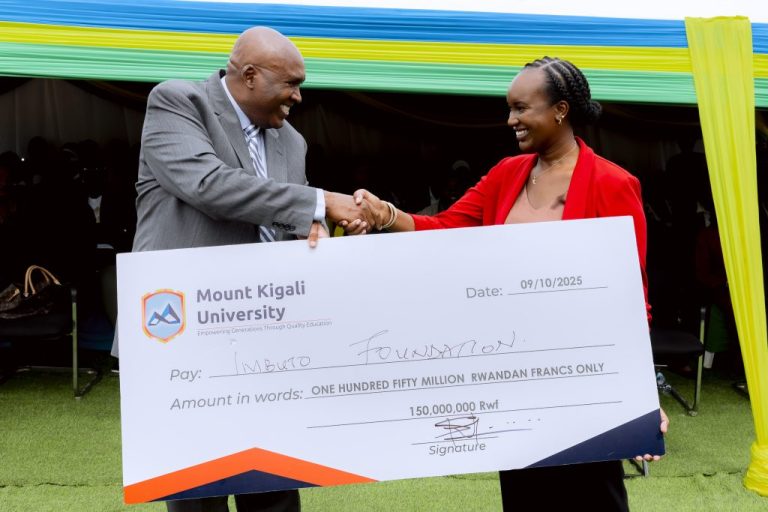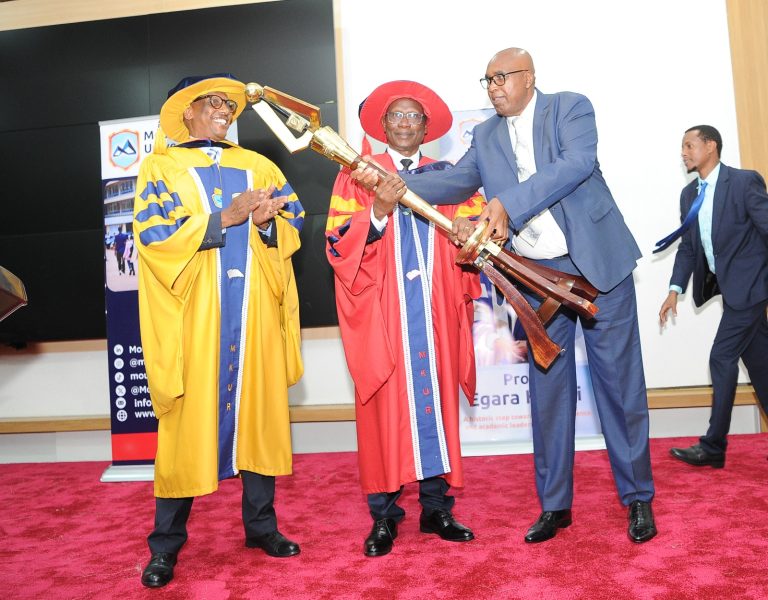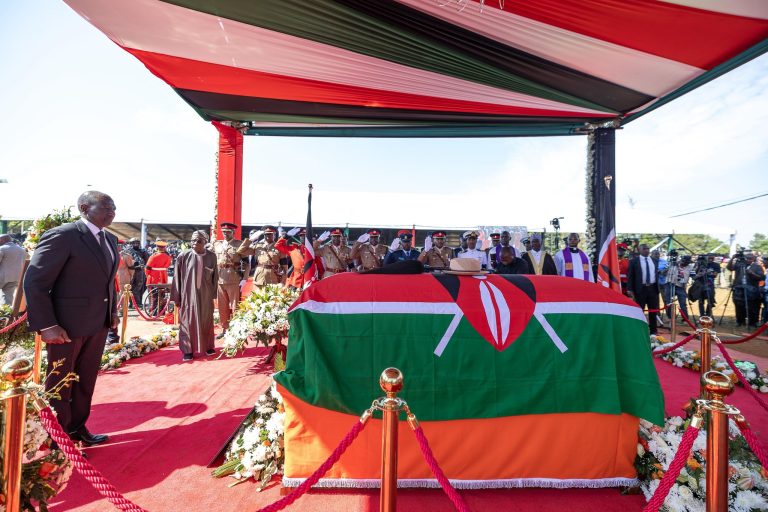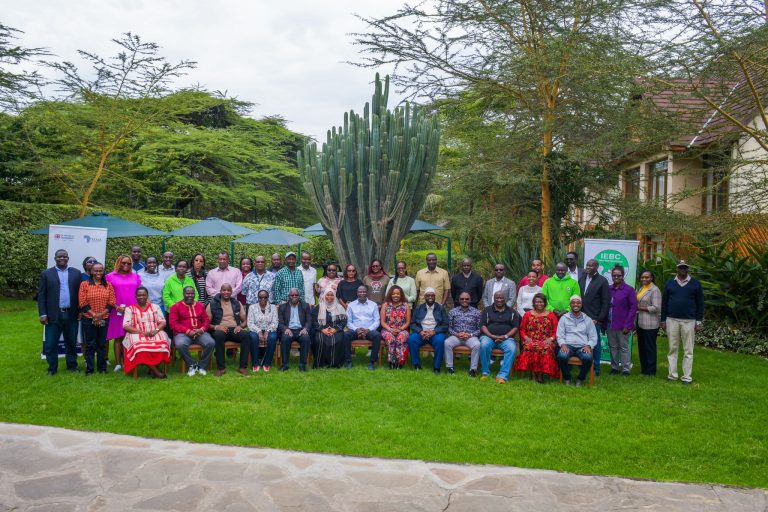
Dr. Tonny Omwansa, Chief Executive Officer of the Kenya National Innovation Agency (KeNIA), delivers his speech during Mount Kenya University’s 27th graduation ceremony at the Happy Valley Grounds in Thika.
A record number of candidates graduated on Friday at Mount Kenya University (MKU) as enrolment continues to grow in leaps and bounds.
Welcoming guests to the 27th Graduation Ceremony and the 4th Graduation Ceremony of Equip Africa Institute, MKU Vice-Chancellor Prof. Deogratius Jaganyi congratulated the graduands on successfully completing their studies.
He said MKU was graduating 8,724 candidates—8,638 from MKU and 86 from Equip Africa Institute—compared to 7,448 who qualified in December 2024. Equip Africa is the Technical and Vocational Education and Training Authority (TVETA)-accredited arm of MKU. The graduates included 10 Doctor of Philosophy (Ph.D.) degrees, 691 Master’s degrees, 150 Postgraduate Diplomas, 5,447 Bachelor’s degrees, 1,965 Diplomas, and 461 Certificates.
Currently, the university has registered 60,223 students in MKU and 1,762 in Equip Africa Institute. “These statistics represent the highest student enrolment the University has ever achieved in the May–August semester/trimester period,” the VC said.
Hosted at the institution’s Pavilion Grounds in Thika Town, the 27th Graduation Ceremony was held under the theme: Catalyzing Innovation: Universities as Drivers of Artificial Intelligence (AI).
Conveying greetings from the University of the West of Scotland, the Glasgow community, and his family, MKU Chancellor Prof. John Struthers congratulated the graduates, their parents/guardians, professors, and university management for the noteworthy achievement.
“For the seven years that I have served as Chancellor at MKU, I have witnessed steady and remarkable growth in this institution, and today’s graduation confirms my vision of a very promising future for this university. The number of students graduating today, as well as outstanding reports on MKU’s engagement at local and global levels presented to us this morning, further attest to that vision,” Prof. Struthers said.
The Chancellor commended new partnership engagements over the past academic year, including MKU’s competitively obtained status as the United Nations Academic Impact (UNAI) SDG 9 Hub Chair on Industry, Innovation and Infrastructure, a three-year position ending in 2027. “This has raised the university’s visibility globally, as evidenced by MKU’s representation at the Global Higher Education Symposium at the UN Headquarters in New York in July 2025, in discussions on the role of higher education institutions in supporting the Sustainable Development Goals (SDGs),” he noted.
Other partnerships—with the Chartered Institute of Arbitrators (Kenya Branch), the International Law Institute – South African Centre for Excellence on alternative dispute resolution and investment arbitration, Marwadi University of India on ICT support, the National University of Science and Technology, the International Maritime College Oman, and the Abu Dhabi Maritime Academy—have further enriched MKU’s programmes.
Prof. Struthers announced the establishment of the MKU Alumni Award with a Sh5 million prize, to be competitively awarded at the December 2025 graduation, in recognition of alumni who have made remarkable contributions to society.
He urged graduates to thank God, their families, and their lecturers for their support, and encouraged them to stay connected to their alma mater for further training and career development.
University Council Chair Dr. Vincent Gaitho announced the approval of a Tuition Fee Remission Policy for all staff and their dependents to enhance welfare and build internal human resource capacity. Parents/guardians with more than two children concurrently enrolled at MKU or its affiliates will also benefit from the policy starting next month.
Dr. Gaitho also announced staff promotions: three senior lecturers elevated to Associate Professor, 16 lecturers to Senior Lecturer, four tutorial fellows to lecturer, and eight other staff members promoted.
On digital transformation, Dr. Gaitho said MKU is embracing Artificial Intelligence as a strategic enabler, with the council approving the implementation of the University Integrated Resource Platform (UnIRP) to enhance teaching, learning, and operational efficiency. He added that MKU has partnered with tech giants such as Microsoft to create an AI-empowered university system.
To tap into global opportunities, MKU has established a Maritime Academy in Malindi to train graduates for jobs in the blue economy. In partnership with the German Academic Exchange Service (DAAD), the university also offers German language training, enabling alumni to access apprenticeship and employment opportunities in Germany.
He advised graduates to embrace lifelong learning: “There are multiple short courses at MKU to complement the qualifications you receive today and make you more competitive.”
Guest speaker Dr. Tonny Omwansa, CEO of the Kenya National Innovation Agency (KeNIA), said the graduation theme is vital for higher education today. “The transformative power of innovation and AI in higher education has emerged as a critical component of the education and research ecosystem,” he said, urging MKU to provide regional leadership in AI adoption.
Dr. Omwansa highlighted KeNIA programmes, including entrepreneurial leadership training for vice-chancellors, research commercialization, innovation awards, policy reviews, infrastructure support, funding for early-stage innovations, and market linkages. He praised MKU’s role in initiatives such as the German-funded DAAD ACCESS 2.0 project (2025–2029), which has secured €4.5 million (Sh682 million) to support student innovation in partnership with 10 affiliate universities.
Under the “Africa Meets Bavaria” project, three MKU students have been mentored in Munich innovation hubs, fostering EU–AU innovation collaboration. KeNIA’s Research to Commercialization (R2C) Accelerator Programme has helped 25 start-ups raise Sh255 million, register 18 new ventures, and create 220 jobs in two years.
Dr. Omwansa urged graduates to be problem-solvers, creating scalable solutions to societal challenges and building sustainable enterprises.
MKU Alumni Association Chair Mr. Gikera Kahara, a Ph.D. candidate in Strategic Management, welcomed the new graduates to the over 130,000-member alumni network. He commended the revitalization of the Directorate of Alumni Relations, the registration of the alumni association, and its active engagement through reunions, webinars, and networking events.
“As young graduates stepping into a world increasingly shaped by AI, you are uniquely positioned to carry forward the legacy of universities as catalysts for innovation,” he said.
The event was attended by, among others, MKU co-founder Dr. Jane G. Nyutu; Vice-Chancellor of MKU Rwanda Dr. Martin Kimemia; Chancellor-designate Prof. Egara Kabaji; Archbishop Anthony Muheria of the Catholic Archdiocese of Nyeri; members of the University Board of Directors and Council; vice-chancellors from other universities; and members of the University Management Board and Senate.
Ends





